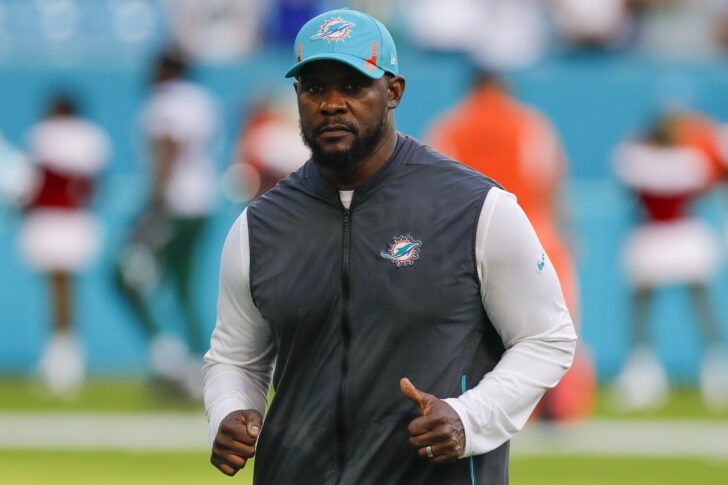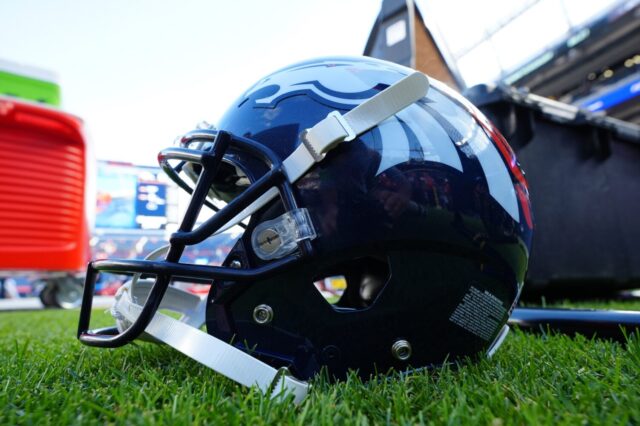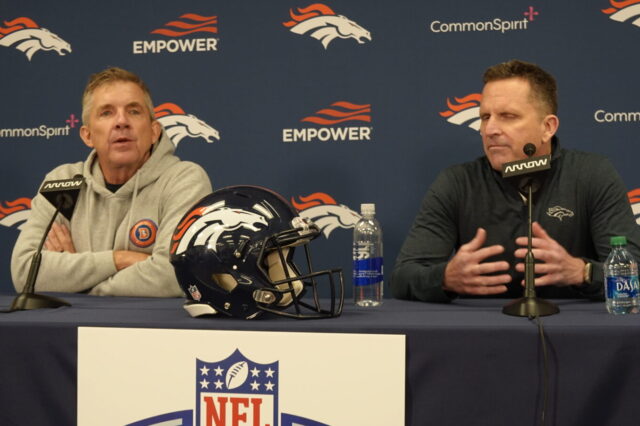It’s often said that the best way to ruin a dinner party is to start discussing politics, religion or race.
Hope you’re not in the middle of supper.
If anyone types these six letters – R-A-C-I-S-M – into any article, column or comment that’s about to hit the internet –just as I’m about to do – ire will undoubtedly follow. I dislike the idea of ruining the dinner party as much as you do, which is to say “I’d prefer not to,” but I’m okay with what I’m about to write.
Brian Flores says the Denver Broncos didn’t hire him because of racism.
I disagree.
It is my opinion that the accusation of racism when it doesn’t exist is almost as bad as racism itself. “Racist” is one of the worst things any human being (of any color) can be called, so long as they’re not.
A few quick disclaimers:
I am white and will never be able to fully understand the pain that comes along with racism towards blacks in America. I can only hope to listen, learn and empathize, and I apologize in advance if this comes across as insensitive to those who actually have felt racism in any form.
I am also not naive enough to believe that racism doesn’t exist within the NFL, as it unfortunately does throughout many, if not most, walks of life. Surely, it’s there too, and I acknowledge that.
I do not know, much less know much about, Brian Flores. I’m certain he’s a good football coach, deserving of any opportunity he’s ever been given or will get going forward. And that has nothing to do with the color of his skin.
Lastly, I don’t believe that a rule, even one with the best of intentions – like the NFL’s Rooney Rule – can change the behaviors, hearts and minds of mankind; if only it were that easy.
With those confessions out of the way, I believe that as important as it is to correct, and ideally end, racism, it’s equally important to use the term responsibly. One arrow misfired can derail an entire war.
Flores is suing the NFL and three of its franchises for being racist, the reason, he believes, he was fired by the Dolphins and not hired by the Broncos or Giants. I can’t speak to the Giants or Dolphins (or the league in general), so I won’t. I’ll stick to the team – and people – I know.
In my heart, I believe that people like John Elway, Joe Ellis, and Patrick Smyth – all individuals representing the Denver Broncos organization through the hiring and interviewing process – are not racists. Over the years, I’ve come to know them, some them better than others. Furthermore, I know plenty of people who know each of them far better than I do. At no point in time, under no circumstance, have I ever witnessed or heard, not even second hand, any of them being racists.
So, when someone accuses them as such, I take offense. I also feel compelled to defend them.
I can write column after column, slamming the Broncos organization for anything you can imagine – ticket prices, their draft picks, their coaching hires, their play call on 3rd and short. I can also praise them for huge wins, great players or their efforts in the community. I can do any and all of that because it’s sports. It’s not life or death, and part of the fun when it comes to sports is debate. I’m not always right (some say I rarely am) but it’s never personal and ideally my opinions spark discussion. The Broncos, in a general sense, and their fans, can agree, disagree or think I’m an idiot. I’m okay with all of that.
But I will happily defend the very same individuals, regardless of what they think of me, when they’ve been accused of something as serious as racism. That’s what Flores is doing through his lawsuit.
Oddly, not long after the interview with the Broncos took place, Flores had glowing remarks for the Broncos organization and various individuals involved in the interview process. Among other things, he called Matt Russell, the Broncos vice president of player personnel, his “good buddy” and noted that the Broncos got the “right coach” in hiring Fangio. It’s quite conceivable that Flores was only offering a politically correct, public quote. But his words then certainly make his actions now feel disingenuous.
And let’s not forget, not long ago, Elway and Ellis hired a black head coach, Vance Joseph, the first in franchise history. Eric Studesville, a man of color who served as interim head coach, was also promoted within the Broncos organization a few years prior to Joseph’s hiring. These men were not granted such opportunities in Denver because anyone in the organization had a burning desire to “check a box.” No, and saying so is doing the coaches a disservice. Joseph and Studesville held those positions because the likes of Elway and Ellis felt they were the best individuals for the job, black, white, orange or purple. In short, they earned their job titles.
Ironically, Joseph was – in the opinion of most – a bad hire (his record speaks for itself). At the time, Joseph was selected over Kyle Shanahan, a white offensive coordinator who had family ties to the organization and who had an arguably more impressive resume. Shanahan, the offensive coordinator of the Falcons, was coming off a near win in Super Bowl LI; Joseph had just been the defensive coordinator of the Miami Dolphins, a middle of the road defense at best. Shanahan went on to coach the 49ers in Super Bowl LIV and guided his team to the NFC Championship Game last weekend. Joseph limped to a two-season record of 11-21 in Denver.
I wrote many opinion pieces griping about what a missed opportunity the hiring of Joseph – and not Shanahan – represented. But never, not once, did I think of race. And given the fact that the Broncos hired the black coach – and not the white one –
race didn’t play into their thinking either. Nobody – and certainly no rule – made the Broncos hire Joseph.
That’s the beauty of sports, too. At the end of the day, the scoreboard is the only thing that matters. Not the color of the jersey or the color the competitor wearing it. If a man as competitive as Elway thinks there is even the slightest chance that one coaching candidate gives him a competitive advantage over another, he’ll go with the individual that gives him the best chance to win. That person could be male, female, black, white, Hispanic, Asian or from another planet all together. Winning, at least in my experience, tends to be colorblind.
Jackie Robinson was so vital to sports because he broke a barrier that had never been broken. And when he did, the floodgates opened. Because he was so good, and because he was such a strong and principled person, owners and managers – regardless of whether they were racists or not – had to acknowledge they were putting themselves at a competitive disadvantage if they refused to consider black athletes. If they wanted to stick to their racist practices, they’d be drawing from a much smaller talent pool. That didn’t mean that racism in Major League Baseball had suddenly disappeared, but ultimately, the score and the standings became the ultimate equalizer, dictating opportunity to ballplayers based on ability and results, not color. Right or wrong, that’s what happened.
In the modern NFL, black coaches like Tony Dungy or Mike Tomlin have been extremely successful. Others, like Joseph, have had less success when their opportunity arose. Neither result is because they’re black, it’s because they’re outstanding at their job, or perhaps they have the potential but still need time to develop. Or, maybe one’s situation was simply better (that happens in all sorts of professions, by the way). Bill Belichick is a good coach, and isn’t retained by the Patriots, because he’s white. He wasn’t a great coach with the Browns because he hadn’t fully honed his craft and (probably) didn’t have Tom Brady; by the time he got the job in New England, he was better prepared and in a better situation. Besides, hiring a coach is a speculative endeavor at best. Even the best general managers miss, making great hires or big mistakes having nothing to do with race.
In the case of the Broncos, and the coaches they’ve hired versus coaches they didn’t, take race out of the equation. Joseph was hired in favor of Shanahan and it was a poor hire. Fangio was hired over Flores, and it was arguably a bad hire, too. But at the time, Fangio was an incredibly respected defensive coordinator running one of the league’s best defenses. Flores would have jumped from being a linebackers coach to a head coaching position, skipping the job of defensive coordinator all together.
Notice, the words “black” and “white” weren’t necessary in order to paint the picture. Sure, there are always other factors – the interview, references, the situation each coach experienced. But sometimes the obvious conclusion is that a team, and the individuals working for it, just came to, well, the obvious conclusion. Not every hire, fair or unfair, good or bad, is fueled by race.
And, in fairness to everyone who’s been the victim of racism, some hiring decisions – sadly – still are. Let’s not pretend that’s not true.
But this one? It feels like suggesting racism is a stretch.
I do not have the pool of evidence that Brian Flores has. He was there; I wasn’t. So anytime you’d like to tell me to shut the hell up, and please pass the potatoes, you’re free to do so.
But my gut – and my personal knowledge of the accused – tells me that Flores is making an incredibly dangerous accusation.
One that could do more harm than good.



